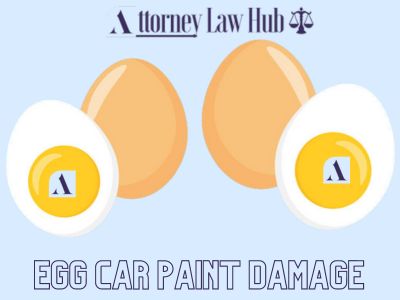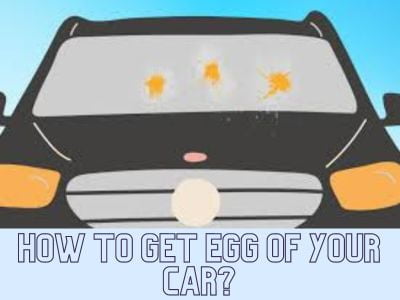Yes, egging a car is generally illegal. It is crucial to understand that this conduct may lead to a number of legal consequences, including fines or even criminal prosecution. It’s important to know that in many places, it’s illegal to damage someone’s property, even a car.
Vandalism may be defined as egging a vehicle. The deliberate damage or Violent behaviour of another person’s property is known as vandalism. It is illegal to egg cars because doing so could lead to further damage to the paint job.
“Is egging a car illegal? Between pranks and penalties, the line is often scrambled.”
“Is egging a car illegal? It’s more than just a yolk when justice gets involved.”
by Attorney Law Hub
The degree of the damage, the regulations in your area, and whether this is your first offence or a recurrent one are usually the main determinants of the severity of the punishment.
Egging a car can have a variety of consequences, such as fines, probation, or, in more extreme situations, criminal charges against you. It’s critical to understand that even a harmless practical joke may have legal consequences.
The best course of action is to show consideration for other people’s property and refrain from taking part in any actions that might get you into legal problems. As an alternative, think of enjoyable and law-abiding ways to pass the time or make jokes that won’t hurt anyone or violate the law. Recall that being a responsible member of your community includes respecting the property of others.
Egg car paint damage

Throwing eggs at a car can result in damage to the paint and overall appearance of the vehicle, among other unfavourable results. Here’s how egg damage might affect a car in more detail:
Chemical Reaction:
Minerals, lipids, and proteins are all present in eggs. These materials have the ability to react with an automobile’s paint job when they come into contact with it. Egg proteins have the ability to stick to paint, making removal challenging.
Paint Erosion:
If eggs’ proteins are left on an automobile’s paint, the paint may deteriorate. This may lead to a loss of the vehicle’s shiny condition and paint damage.
Stains:
The surface of the car may have ugly stains from eggs. The colour of these stains can range from yellow to white, depending on how fresh the egg is. Cars with darker colours may show stains more clearly.
Acidic Nature:
Over time, paint may deteriorate due to the moderate acidity of eggs. Deeper damage may result from the egg eating away at the paint if it isn’t removed from the car as soon as possible and completely.
Removal Difficulty:
Removing damage to eggs might be difficult. If left alone, it could take a lot of cleaning—and occasionally even professional detailing—to have the car looking like new.
Expensive Repairs:
Repainting or repairing egg damage can be costly, particularly if the paint has become worse. This can require going to an auto body shop, which can be very expensive.
Effect on Resale Value:
An automobile that has obvious egg damage will probably fetch less at auction. A car that exhibits indications of damage or neglect may make potential purchasers hesitate to acquire it.
It’s critical to clean the impacted area as soon as possible to avoid egg paint damage. Stay clear of hot water and rough objects, as these might exacerbate the damage. Instead, use a mild car wash solution and cold water.
To repair the car’s appearance and preserve its worth, if the damage is significant, think about getting professional assistance. Discouragement of this type of pranking conduct can also aid in averting such events in the first place.
What can the police do if someone eggs your car?
You can report the event to the police if someone eggs your car. Depending on the local laws and the particulars of the occurrence, the police may not be able to take certain actions in response to egging a car. The following are some actions the police could take:
Initial investigation:
The police will probably launch an inquiry once you report it. This could entail gathering proof, including pictures of the damage, speaking with witnesses, and searching for any possible security camera footage.
Documentation:
Providing the authorities with as much information as you can is essential. This contains the incident’s specifics, the time it happened, and, if you have any information about them, any possible suspects.
Evaluation of Damage:
The police response may vary depending on the severity of the damage to your vehicle. It might qualify as a misdemeanour if the damage is not great. On the other hand, it might receive greater attention if the damage is significant or represents a pattern of vandalism.
Criminal Charges:
Vandalism such as egging a car carries the possibility of criminal prosecution for anyone involved. The magnitude of the harm and the legislation in your country may determine how serious the charges are. Penalties can include fines, community service, probation, or even jail time in more serious situations.
Restitution:
The police frequently offer assistance in the effort to get compensation for the harm done. This can entail the offender repaying you for the harm or covering the cost of your car’s repairs.
Protection Orders:
In order to stop additional harassment, you can ask for a restraining order or protective order if you know who is at fault and feel uncomfortable.
Prevention and deterrence:
The police may also provide information about neighbourhood watch programmes or security measures, as well as suggestions on how to avoid such incidents in the future.
It is crucial to keep in mind that the particular steps that law enforcement takes can differ between jurisdictions and are contingent upon the particular facts of each case.
When egging is part of a pattern of illegal behaviour, the response can be as severe as is necessary, ranging from a warning or ticket to an arrest and prosecution. Enforcing the law and safeguarding your rights as a vandalism victim requires you to report such crimes to the authorities.
How to get egg of your car?

Although removing eggs from your car can be a pain, follow these instructions to remove them safely and without scratching the finish:
Materials you’ll need:
- Mild liquid dish soap
- Bucket
- Warm water
- Soft microfiber or cotton towels
- Gently abrasive cleaning clay (optional)
- Car wax (optional)
Step-by-Step Process:
Move fast:
It’s critical that the egg be taken out as soon as possible. It becomes more difficult to clean the longer it sits.
Preparation:
To prepare, make a soapy solution in a bucket by mixing a few drops of mild liquid dish soap with warm water.
Rinse:
Use a gentle water rinse to get rid of any leftover eggshells and residue from the affected region. Scrubbing could scratch the paint, so proceed with extreme caution.
Soak and soften:
After soaking a gentle cotton towel or microfiber in the soapy water, apply it over the stained region of the egg for a few minutes. This aids in the egg residue’s softening.
Gently Wipe:
After soaking, use a soft cloth or towel to gently wipe away any remaining egg residue. Try not to apply too much pressure to avoid scratching.
Clay Bar (if needed):
If necessary, apply a mildly abrasive cleaning clay to any remaining residue or areas where the egg has caused paint damage. Use a lubricant (water or soapy solution) and follow the product’s recommendations to avoid scratches.
Rinse Again:
To get rid of any last bits of soap or egg residue, rinse the area well with clean water.
Dry Carefully:
Gently pat the car’s exterior dry with a fresh, gentle microfiber cloth.
Inspect for damage:
Pay close attention to any scratches or paint damage. You could require expert help to repair it if there is damage.
Wax:
You can optionally treat the cleaned area with auto wax to preserve the finish of your vehicle. As directed by the manufacturer, apply the wax product.
Recall that the most important thing is to proceed carefully to prevent scratching the paint on your car. To be sure, or if the egg has really damaged the vehicle, get advice from a professional car detailing service. In order to avoid vandalism, think about storing your car in a garage or another secure area. Preventing repeat incidences is also crucial.
Can egging a car result in criminal charges?
Yes, egging a car can result in criminal charges. You can be engaging in vandalism when you egg a car, which is illegal in many jurisdictions. Depending on the scale of the damage, local regulations, and your prior criminal history, among other things, the charges and possible fines may not always be the same.
Egging is an example of an apparently insignificant activity that can have serious legal consequences, such as imprisonment, fines, or even a criminal record. It is advisable to avoid doing such things and to respect other people’s property in order to avoid getting into trouble with the law.
What penalties can someone face for egging a car?
Egging a car can result in different punishments based on a number of factors, such as the degree of the damage, applicable local laws, and whether this is the first or second offence. On the other hand, typical sanctions could be:
Penalties:
Violators might have to pay fines to offset the expense of having the car cleaned or repaired.
Probation:
Certain persons may be placed on probation, which may entail activity limitations and frequent check-ins with a probation officer.
Community Service:
As a way for offenders to atone for their transgressions, community service may be mandated.
Criminal Record:
In more extreme situations, egging a car may lead to a criminal record, which may have long-term effects on one’s ability to get employment and other facets of life.
It’s critical to note that jurisdictions can have different exact penalties and that more severe consequences may result from repeated offences or cases involving significant damage. As a matter of courtesy and to protect other people’s property, it is usually best to refrain from participating in such activities.
Conclusion
In conclusion, it should be noted that egging a car is not only forbidden but may also have consequences. It may result in criminal charges, harm the paint and appearance of the car, and carry consequences like fines, probation, community service, or even a criminal record.
It’s critical to notify the police of these occurrences and take the appropriate actions to safely remove egg residue from your car. In the end, the greatest method to stay out of legal trouble and preserve a peaceful community is to respect other people’s property and abstain from such behaviour.




